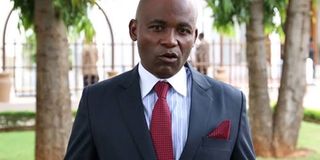Prime
The day Dr Ndugulile ‘confronted’ Magufuli on Covid-19 treatment

What you need to know:
- Despite the political risks, Dr Ndugulile voiced his concerns. In April 2020, he publicly warned against the use of steam inhalation as a treatment for Covid-19, stating it could obstruct the respiratory system.
Dar es Salaam. At a time when Tanzania was promoting an unconventional approach to the Covid-19 pandemic, one man dared to stand by his professional convictions — Dr Faustine Ndugulile.
As the Deputy Minister for Health, Community Development, Gender and the Elderly, his time at the docket marked an important period when science clashed with politics under the leadership of the late President John Magufuli.
The Covid-19 officially broke out towards the end of 2019 but Tanzania registered its first imported case of the disease on 16 March 2020.
The disease ushered in a period of uncertainty to experts at the Health ministry which, at that time, was under Ummy Mwalimu as its minister.
The government's response to the pandemic quickly diverged from global norms. President Magufuli declared Tanzania "Covid-free" and instead, he endorsed traditional and herbal remedies while openly questioning the reliability of scientific methods.
For health experts, this was a challenging time. Many found themselves navigating a fine line—balancing their professional knowledge, political loyalty and a desire to remain in the president's good books. Dr Ndugulile, however, chose to remain a respected medical personnel.
Magufuli’s controversial measures
President Magufuli was firm in his beliefs. He openly dismissed conventional scientific approaches and endorsed alternative methods such as steam inhalation and herbal concoctions.
In May 2020, Tanzania even received a shipment of Madagascar’s herbal remedy for Covid-19, despite global skepticism and World Health Organization (WHO) warnings about its unproven efficacy.
In April 2020, the president promoted steam inhalation, claiming it could kill the virus by melting it at high temperatures.
He also questioned the credibility of the national health laboratory.
After claiming he had secretly tested a papaya, a quail and a goat—all of which allegedly yielded positive results for Covid-19—he accused the lab of playing a "dirty game."
The laboratory director, Nyambura Moremi, was subsequently suspended.
The Health Ministry saw significant personnel changes during this period, with the then Permanent Secretary, Dr Zainab Chaula, being moved to the communications docket, while the Chief Medical Officer, Prof Mohamed Bakari, retired. They were replaced by Prof Mabula Mchembe and Prof Abel Makubi.
Dr Ndugulile’s defiance
Despite the political risks, Dr Ndugulile voiced his concerns. In April 2020, he publicly warned against the use of steam inhalation as a treatment for Covid-19, stating it could obstruct the respiratory system.
Speaking to a local television station, he emphasized that some traditional remedies being touted were not medically sound.
“A number of people have spoken about some traditional remedies to Covid-19... Putting the patient close to the vapour of some heated or boiled herbs is not the right option because it may obstruct a respiratory system that cannot tolerate too much heat,” Dr Ndugulile cautioned.
His comments stood in stark contrast to the government’s narrative, placing him in a precarious position. By mid-May 2020, Dr Ndugulile was removed from his post and replaced by Dr Godwin Mollel. The move was seen by many as a direct consequence of his dissent.
Though he was politically wrong, Dr Ndugulile’s stance shows his commitment to scientific integrity during the pandemic.
While his removal from office may have been a setback, his unwavering commitment to medical ethics earned him respect among peers and the public.
This is precisely what his colleagues remember him for even to-date.
Speaking to The Citizenon Thursday, November 28, 2024, the President of the Medical Association of Tanzania, Dr Mugisha Nkoronko, termed Dr Ndugulile as a courageous professional who lives by what he learnt in the classroom during the Covid-19 pandemic.
“Dr Ndugulile proved to his colleagues that at some point, you need to stick to a professional decision no matter the consequences,” Dr Nkoronko said.
“His voice on matters of health, especially on coronavirus, HIV and malaria, was one of reason and expertise. In the world we live in, we must adopt professional approaches, even when it is costly. Dr Ndugulile lived that spirit.”
Dr Ndugulile held a Doctorate of Medicine and a Master of Science in Microbiology from the University of Dar es Salaam, as well as a Master of Public Health from the University of the Western Cape.
With specialties in public health and medical microbiology, he was a respected figure in addressing infectious diseases such as HIV, malaria and coronavirus.
His contributions extended beyond the medical field. Dr Ndugulile entered politics in 2010 and served as the Member of Parliament for Kigamboni.
He also held various leadership roles, including Vice-Chairman of the Parliamentary Standing Committee on Social Services and Community Development and Chairman of the Parliamentary Committee on HIV/AIDS and Substance Abuse.
Internationally, he was a member of the Pan African Parliament (2015–2017) and affiliated with organizations such as the American Society of Microbiologists and the Tanzania Public Health Association.
He also served as Secretary-General and later Chairman of the Tanzanian Parliamentarians AIDS Coalition (TAPAC).
In August 2024, Dr Ndugulile achieved a milestone when he was elected as the Africa Regional Director for the WHO.
He was set to assume office in March 2025, a role that would have allowed him to steer health policies and initiatives across the continent. His election reflected his growing influence and the trust placed in his vision for addressing Africa’s health challenges.
Dr Ndugulile’s untimely death has left a void in both national and global health sectors.
His appointment to the WHO was seen as a strategic move to bolster the organization’s capacity to combat diseases in Africa, a testament to his expertise and leadership.



